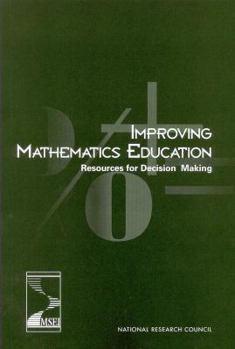Improving Mathematics Education: Resources for Decision Making
Improving Mathematics Education has been designed to help inform stakeholders about the decisions they face, to point to recent research findings, and to provide access to the most recent thinking of experts on issues of national concern in mathematics education. The essence of the report is that information is available to help those charged with improving student achievement in mathematics. The documents cited above can guide those who make decisions about content, learning, teaching, and assessment. The report is organized around five key questions:
What should we teach, given what we know and value about mathematics and its roles? How should we teach so children learn, given what we know about students, mathematics, and how people learn mathematics? What preparation and support do teachers need? How do we know whether what we are doing is working? What must change?Each of the five main chapters in this report considers a key area of mathematics education and describes the core messages of current publication(s) in that area. To maintain the integrity of each report's recommendations, we used direct quotes and the terminology defined and used in that report. If the wording or terminology seems to need clarification, the committee refers the reader directly to the original document. Because these areas are interdependent, the documents often offer recommendations related to several different areas. While the individual documents are discussed under only one of the components in Improving Mathematics Education, the reader should recognize that each document may have a broader scope. In general, the references in this report should serve as a starting point for the interested reader, who can refer to the original documents for fuller discussions of the recommendations and, in some cases, suggestions for implementation. Improving Mathematics Education is designed to help educators build a critical knowledge base about mathematics education, recognizing that the future of the nation's students is integrally intertwined with the decisions we make (or fail to make) about the mathematics education they receive.





